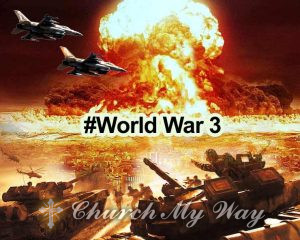The Church’s Perspective on the Approach of World War III
The Church’s Perspective on the Approach of World War III is a very broad topic. It has to do with the perspective of the church on various aspects of war, from its approach to its participants. The church is an institution that has been around for a long time and it has been present throughout all wars in history. It is also a religious institution, which means that it is not just concerned with worldly issues but also spiritual ones.
Some people believe that the Church should be more involved in world affairs and try to prevent wars from happening or stop them before they happen. Others believe that this would go against God’s will as wars are part of his plan for humanity, and therefore there is nothing that can be done about them.
Introduction: World War III Approaching, But is the Church Prepared?
The world is on the verge of World War III and the Church is not prepared. Have we been too focused on a culture war?
With the threat of a third world war looming, it is important to consider what the church’s response should be.
The church has been called for centuries to be a light in the darkness. It is our responsibility as Christians to spread hope and peace in times of turmoil and uncertainty.
World War III is coming, but is the Church prepared?
The question of whether or not we are living in the “end times” has been a popular one for many years. It seems as though there is always a new apocalyptic prediction that has to be considered. But when it comes to the Church, will they be ready when the world goes up in flames?
There are many things that the Church can do to prepare for World War III and still maintain their integrity. The church can create emergency response teams who are responsible for different tasks such as food distribution, medical care and shelter. They should also have a plan to respond to attacks on religious communities and leaders which could include both physical attack and cyber-attacks.
How Can Peace Be Achieved in a Post-War World?
Peace after war is an important topic to discuss. The world is still recovering from the damages of the wars. The idea that peace can be achieved in a post-war world is still discussed and debated.
Some people believe that peace cannot be achieved in a post-war world because there are too many people with anger and resentment, who want revenge and justice. These people will not give up their anger until they get what they want. Others believe that peace can be achieved if we change our way of thinking about the past and forgive those who have done wrongs to us, which will help us move on from the past and look towards a better future.
All Violent Crime Offender vs Victim Demographics in the USA 2021-2022
The United Nations has created a list of steps that can be taken to achieve post-war peace. The first step is establishing an environment where there is no hostility between neighbouring countries. Once this has been achieved, the next step is to work on the shared interests of neighbouring countries.
What are the Threats to Our Peaceful Existence and How Can We Best Prepare for Them?
Threats to our peaceful existence are increasingly becoming a reality. The world has seen many wars and conflicts in the past. It is possible that we may have a post-war era in the future. In this section, we will explore what threats may arise and how we can best prepare for them.
The first threat to our peaceful existence is the potential of nuclear war. Countries like North Korea are still developing their nuclear capabilities and thus make it difficult to stop a nuclear war from happening. The second threat is terrorism, which has been around for centuries and will continue to be around for centuries more. Third, natural disasters such as hurricanes can cause great damage if they hit an area with a high population density or if they strike an area with no warning signs beforehand. A fourth threat comes from climate change.
How Does One Pursue Peace in Today’s Turbulent Environment?
The pursuit of peace is an ongoing process. It is not something that can be achieved in a day or a week. Peace must be pursued every day, in every way possible, and with all the resources at our disposal.
We must pursue peace with our words and actions, as well as with what we say to ourselves. We must pursue peace by listening to others and understanding their point of view, by taking time for ourselves to de-stress, and by seeking help when we need it. We also have to pursue peace through action – through volunteering at a soup kitchen or joining a protest march.






